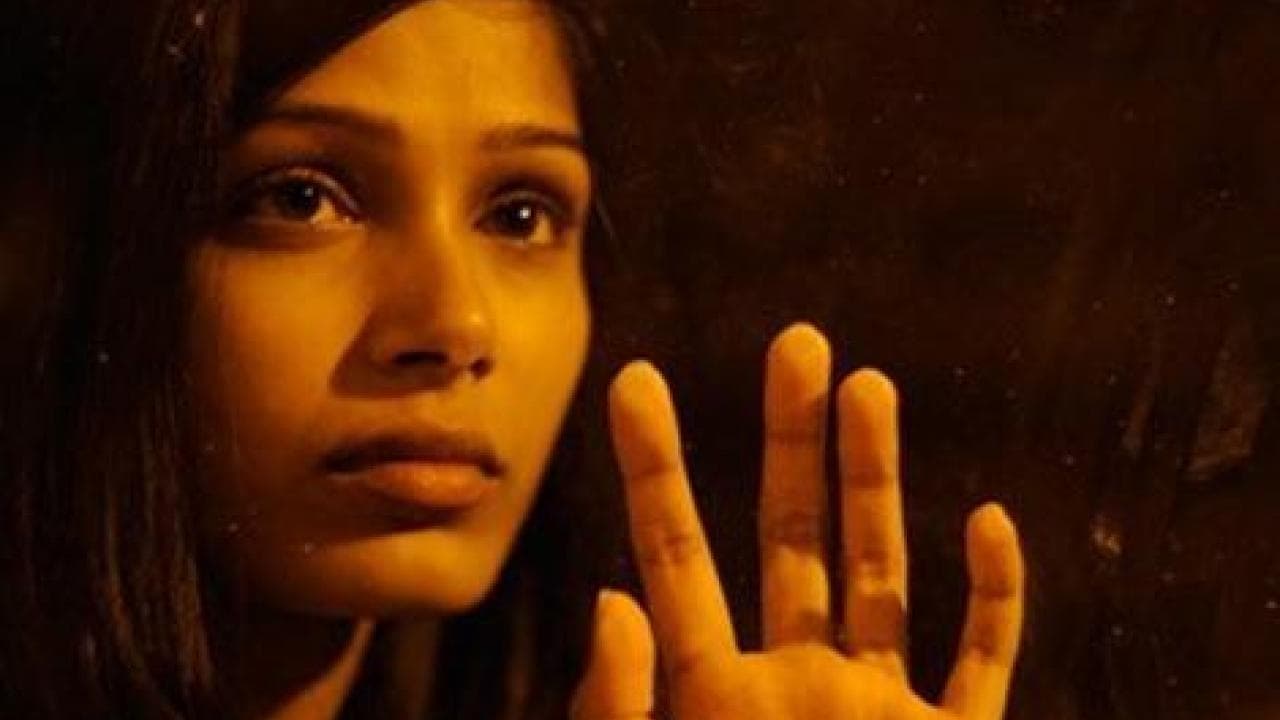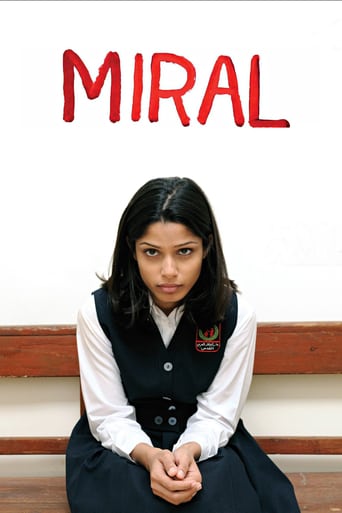SpuffyWeb
Sadly Over-hyped
Ameriatch
One of the best films i have seen
Tedfoldol
everything you have heard about this movie is true.
Calum Hutton
It's a good bad... and worth a popcorn matinée. While it's easy to lament what could have been...
jotix100
Julian Schnabel's "Miral" was shown recently on cable. Not having seen it before, we decided to take a chance. The director whose previous work showed a rare quality in telling a story, working on Rula Jebreal's novel and with a screenplay by the author, takes a look at recent history, analyzing it from the less popular side of the Palestinians, who have lived in conflict after the creation of the state of Israel in 1947.The story deals with a kind hearted lady, Hind Husseini, who is surprised to find a large amount of orphans roaming the streets. She takes the children into her home, and later creating a school in which to educate and house the young innocent victims. Hind's life was given to help the unfortunate children that came into her school and her life.Miral, a young woman, was the product of the system Ms. Husseini created. Unfortunately, she gets to witness, first hand, the way her fellow Palestinians were being treated by the Israelis. In fact, Miral falls in disgrace when the man she falls in love with, forces her to carry a device which fortunately does not explode. Her life changes instantly as she has to experience the way she is treated and abused by the Israelis.Mr. Schnabel's sympathies are with the Palestinians, something that he has not been able to avoid in the way he presents the material. The many years of fighting between Israel and its neighbor has produced wounds that are hard to heal. The film ends with the Oslo Peace Accords of 1993 in which some hope for peace seemed possible, something that in real life never happened.The wonderful actress Hiam Abass is seen as Hind, although she is only seen briefly as she goes from a young woman to her death. Freida Pinto, the Indian actress does what she can with a role that should have been played by a young Palestinian actress. There are familiar faces among the cast. Vanessa Redgrave and William Dafoe are seen in minor roles.
eddiez61
Movies are not important. Despite what critics, producers, writers, directors, actors, IMDb commentors, or anyone else thinks, there's nothing about a movie that is inherently, genetically important. There are rarely, if ever, any dire consequences in choosing to watch a movie — no one's life is depending on it. The country, the planet, the universe could not care less about your film going habits.But a great film can certainly affect us profoundly. This is an experience that we cherish and revere, and since we are so defensive of our emotional lives we define these compelling moments as important. The experience may be important, but the film is not. The film's just a vehicle, a messenger, a ploy to insinuate into our lives someone else's experience. That's why this film, Miral, is not nearly as wonderful as it could have been. It seems to have the attitude that it's important. This pompous disposition is not obvious, not flagrant, but it is persistent and distracting. And the great irony of it is that Julian Schnabel has purposely contrived his film hoping to avoid this very accusation.It's a decidedly modest, nuanced and low key depiction of the terrible situation in the middle east as seen almost exclusively from the view point of Palestinian women. The film is self consciously playing against the thunderous, deafening roar of western media coverage of the conflict. Today we are daily deluged with horrific videos, graphic images and hysterical hyperbolic reports of the conflict; a formidable din over which sincere voices labor to be heard. So by playing it softly - speaking under the crowd - Miral draws attention to itself. Isn't that what a film is supposed to do, distinguish itself? Well, normally yes, a film doesn't have much choice but to flaunt itself, toot its own horn. But when the subject is so fundamentally daunting, so depressingly perplexing, so infuriatingly confounding - so important - it's bad taste to insist that we acknowledge the story teller as much as the story. By going so blatantly against the grain with his curious cinematic style Schnabel has directed our attention more so to his creation - and himself - at the expense of his film's subject. His artful approach served him so well in his previous films but here it sabotages his efforts. And just to be sure he's torpedoed the whole enterprise he closes it with the doleful, raspy croak of that beloved Palestinian crooner, Tom Waits. Tom Waits?! Oy vey, that's meshugenah!Avoiding the cliché, dodging the obvious, scorning the conventional is the mortal pledge of any worthwhile artist, and so Julian can be partly forgiven his miscalculations. But an unpardonable fault is the lack of a truly capable, compelling character for us to focus on. His stars are beautiful and photogenic but so overwhelmed with the responsibilities with which they have been charged. They just don't have the chops to command our attention, and so our gaze and thoughts fix on other things, such as the film's distinctive stylization, and it's leap-frog time sequencing. The dialog is so stilted and labored; the actresses too often "reading" their lines. (Except, of course, Vanessa Redgrave, who should have been in much more of the film, maybe even reading everyone else's lines!) Though it's based on a true story many scenes ring false. I often found myself thinking "what a clever, well meaning film." That's a thought no film should ever illicit, at least not till it's over. While it's happening you should be engulfed in an experience, oblivious of yourself.Set in the locale of what may well be "ground zero" in determining the fate of our world, Schnabel should have played up to the roiling, cacophonous, volcanic environment into which his film softly whispers. Despite that old corny expression about whispers and wanting to be heard, this is one time when it would have been better to be bold. Its tag line, "Is this the face of a terrorist?," sadly points to the film's greatest weakness - for all its gestures towards profundity, it's too focused on the "face" and not the heart and soul. Miral is too cute for its own good.
Lee Eisenberg
Without a doubt, the Israel-Palestine conflict has been one of the most controversial issues of the past few decades, and one on which very few movies are willing to focus. That makes Julian Schnabel's "Miral" all the more important.The movie is based on Palestinian author Rula Jebreal's autobiography, focusing half on her childhood and half on the Dar al-Tifl Institute founded in the wake of the Deir Yassin Massacre. The institute's founder Hind Husseini (Hiam Abbass) manages to keep the institute and its students safe from events outside. Miral (Freida Pinto) gets sent to Dar al-Tifl at the age of seven. Her life is mostly easy until the intifada, when Israel tightens security, making life even more difficult for the Palestinians. Miral's friend Hani (Omar Metwally) insists on taking militant action against the occupying forces, while Hind Husseini warns Miral not to do anything that endangers her future. In short, Miral has practically no good choices.Aside from bringing up the Israel-Palestine conflict, part of what I like about "Miral" is that it shows the day-to-day lives of the Palestinians. The reminds us that these people about whom we usually hear in the context of war -- or simply get called terrorists -- are human beings. If the movie has any downside, it's that the jumping back and forth between Miral herself and Dar al-Tifl is a bit confusing at times, but overall I strongly recommend this movie.Also starring Alexander Siddig, Makram Khoury, Willem Dafoe and Vanessa Redgrave (who of course mentioned Palestine while accepting her Oscar for "Julia").
nyshrink
I was amazed at how non-political this movie was. There was a great deal of controversy around it, so I was expecting a polemic. It was nothing of the kind. It portrays the childhood and adolescence of a Palestinian girl, along with stories of her mother and her school headmistress. These stories illustrate, to some degree, the Palestinian history from 1947 to 1993. But the focus is on the women's stories. I think this is a movie that will be appreciated far more by women than by men. It is poignant and respectful. Most women will find something with which to identify in this film. The cinematography is beautiful and the lead actors are compelling in their roles. The movie has been criticized as disjointed, but that's because real life does not have a formulaic dramatic arc. And sadly, there is no "conclusion" to the movie because the conflict is ongoing.

